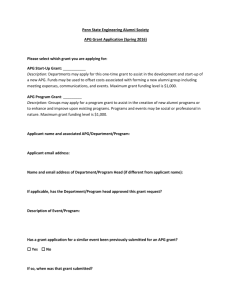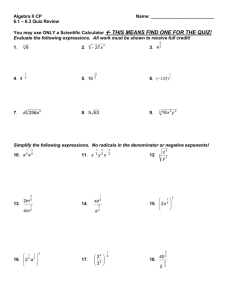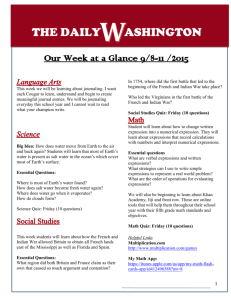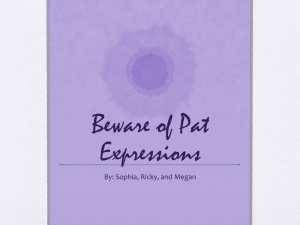Course Planner
advertisement
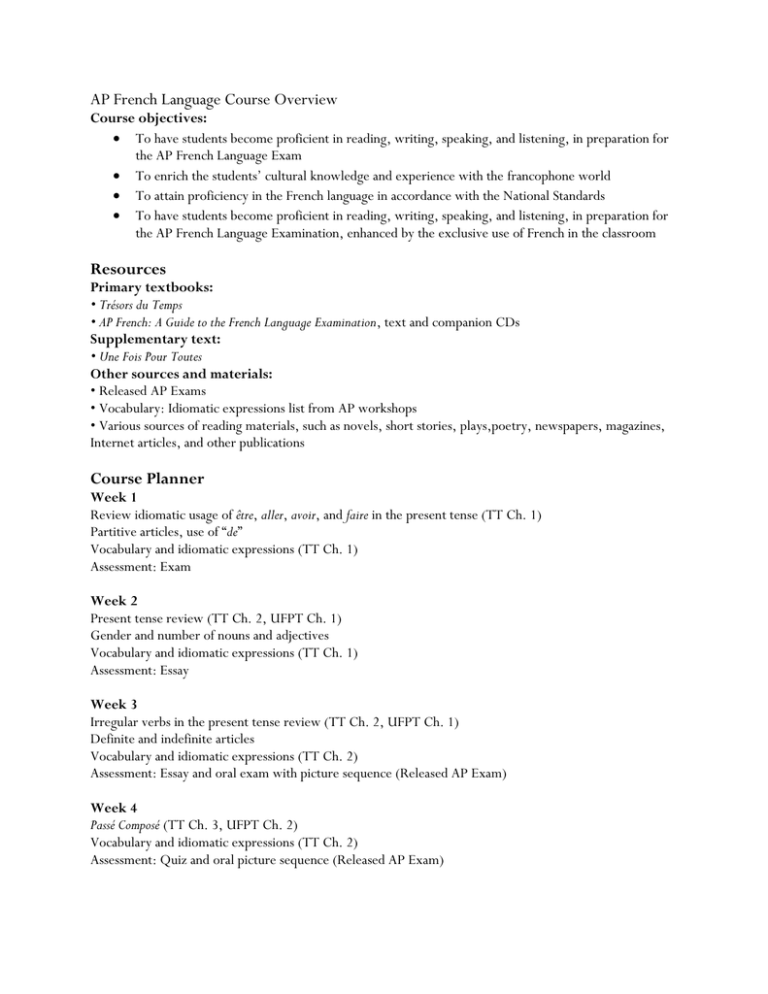
AP French Language Course Overview Course objectives: To have students become proficient in reading, writing, speaking, and listening, in preparation for the AP French Language Exam To enrich the students’ cultural knowledge and experience with the francophone world To attain proficiency in the French language in accordance with the National Standards To have students become proficient in reading, writing, speaking, and listening, in preparation for the AP French Language Examination, enhanced by the exclusive use of French in the classroom Resources Primary textbooks: • Trésors du Temps • AP French: A Guide to the French Language Examination, text and companion CDs Supplementary text: • Une Fois Pour Toutes Other sources and materials: • Released AP Exams • Vocabulary: Idiomatic expressions list from AP workshops • Various sources of reading materials, such as novels, short stories, plays,poetry, newspapers, magazines, Internet articles, and other publications Course Planner Week 1 Review idiomatic usage of être, aller, avoir, and faire in the present tense (TT Ch. 1) Partitive articles, use of “de” Vocabulary and idiomatic expressions (TT Ch. 1) Assessment: Exam Week 2 Present tense review (TT Ch. 2, UFPT Ch. 1) Gender and number of nouns and adjectives Vocabulary and idiomatic expressions (TT Ch. 1) Assessment: Essay Week 3 Irregular verbs in the present tense review (TT Ch. 2, UFPT Ch. 1) Definite and indefinite articles Vocabulary and idiomatic expressions (TT Ch. 2) Assessment: Essay and oral exam with picture sequence (Released AP Exam) Week 4 Passé Composé (TT Ch. 3, UFPT Ch. 2) Vocabulary and idiomatic expressions (TT Ch. 2) Assessment: Quiz and oral picture sequence (Released AP Exam) Week 5 Imparfait (TT Ch. 3, UFPT Ch. 2) Imparfait versus Passé Composé Vocabulary and idiomatic expressions (TT Ch. 3) Assessment: Essay Week 6 Plus-que-parfait (TT Ch. 3, UFPT Ch. 2, APG Unit 5) Review of all past tenses in combination Vocabulary and idiomatic expressions (TT Ch. 3) Assessment: Exam and oral picture sequence (APG Unit 8) Week 7 Future (TT Ch. 4, UFPT Ch. 3) Sentences with si + future Vocabulary and idiomatic expressions (TT Ch. 4) Assessment: Quiz and essay Week 8 Future and future antérieur (TT Ch. 4, UFPT Ch. 3, APG Unit 5) Sentences with quand, des que, aussitôt que, and si Vocabulary and idiomatic expressions (TT Ch. 4) Assessment: Exam and oral picture sequence (APG Unit 8) Week 9 Conditional (TT Ch. 4, UFPT Ch. 3) Sentences with si + imparfait + conditional Vocabulary and idiomatic expressions (TT Ch. 4) Assessment: Quiz and essay Week 10 Past conditional (TT Ch. 4, UFPT Ch. 3, APG Unit 5) Sentences with si + plus-que-parfait Vocabulary and idiomatic expressions (TT Ch. 4) Assessment: Quiz and oral picture sequence (APG Unit 8) Week 11 Review of past, future, and conditional tenses (APG Unit 5) Sentences with si in all combinations Vocabulary and idiomatic expressions (TT Ch. 4) Assessment: Exam and essay Week 12 The regular subjunctive impersonal expressions (TT Ch. 6, UFPT Ch. 4) Vocabulary and idiomatic expressions (TT Ch. 6) Assessment: Quiz and oral picture sequence (APG Unit 8) Week 13 The subjunctive, irregular verbs, and other expressions (TT Ch. 6, UFPT Ch. 4) Vocabulary and idiomatic expressions (TT Ch. 6) Assessment: Quiz and essay Week 14 The subjunctive after conjunctions (TT Ch. 6, UFPT Ch. 4, APG Unit 5) Vocabulary and idiomatic expressions (TT Ch. 6) Assessment: Quiz and oral picture sequence (APG Unit 8) Week 15 The past subjunctive (TT Ch. 6, UFPT Ch. 4, APG Unit 5) Overall subjunctive review Vocabulary and idiomatic expressions (TT Ch. 6) Assessment: Exam and essay Week 16 Direct object pronouns (TT Ch. 5, UFPT Ch. 5) Vocabulary and idiomatic expressions (TT Ch. 5) Assessment: Quiz and essay Week 17 Indirect object pronouns (TT Ch. 5, UFPT Ch. 5, APG Unit 4) The pronoun “y” Vocabulary and idiomatic expressions (TT Ch. 5) Assessment: Quiz and oral picture sequence (APG Unit 8) Week 18 Stress pronouns (TT Ch. 5, UFPT Ch. 5, APG Unit 4) Review of indirect and direct object pronouns Vocabulary and idiomatic expressions (TT Ch. 5) Assessment: Exam Week 19 Semester review (APG Units 4 and 5) Final exam: Practice AP Exam Week 20 Relative pronouns (TT Ch. 9, UFPT Ch. 1, APG Unit 4) Vocabulary and idiomatic expressions (APG Units 1, 2, and 3) Assessment: Quiz and essay Week 21 Lequel and lequel combinations (TT Ch. 9, UFPT Ch. 1, APG Unit 4) Vocabulary and idiomatic expressions (APG Units 1, 2, and 3) Assessment: Quiz and oral picture sequence (APG Unit 8) Week 22 Relative pronoun review (TT Ch. 9, UFPT Ch. 1, APG Unit 4) Vocabulary and idiomatic expressions (APG Units 1, 2, and 3) Assessment: Exam and essay Week 23 Verb review (APG Unit 5) Negatives (TT Ch. 8) Vocabulary and idiomatic expressions (APG Units 1, 2, and 3) Assessment: Quiz and oral picture sequence (Released AP Exam) Week 24 Demonstrative articles and pronouns (TT Ch. 9, UFPT Ch. 1, APG Units 4 and 5) Vocabulary and idiomatic expressions (APG Units 1, 2, and 3) Assessment: Essay Week 25 Demonstratives review (TT Ch. 9, UFPT Ch. 1, APG Unit 4) Vocabulary and idiomatic expressions (APG Units 1, 2, and 3) Assessment: Quiz and oral picture sequence (Released AP Exam) Week 26 Verb review (APG Units 4 and 5) Vocabulary and idiomatic expressions (APG Units 1, 2, and 3) Assessment: Exam and essay Week 27 Possessive articles and pronouns (TT Ch. 9, UFPT Ch. 1, APG Unit 4) Vocabulary and idiomatic expressions (APG Units 1, 2, and 3) Assessment: Quiz and oral picture sequence (Released AP Exam) Week 28 Possessive review (TT Ch. 9, UFPT Ch. 1, APG Unit 4) Vocabulary and idiomatic expressions (APG Units 1, 2, and 3) Assessment: Quiz and essay Week 29 Verb review (APG Units 4 and 5) Vocabulary and idiomatic expressions (APG Units 1, 2, and 3) Assessment: Exam and essay Week 30 Overall review (APG Units 4 and 5) Assessment: Essay and oral picture sequence (Released AP Exam) Week 31 Overall review (APG Units 1–8) AP Exam Weeks 32–36 Vocabulary and idiomatic expressions Various projects based on films and literature Assessments: Short essays, quizzes, oral reports, and presentations Units of study last approximately three weeks, during which time students are exposed to a variety of readings, vocabulary, auditory texts, grammar concepts, etc.—prompted by the theme introduced in each chapter of Trésors du Temps. Some of the units include the viewing of French films that thematically complement the unit studied. Students are expected to perform a variety of tasks that demonstrate their mastery of the course objectives. The following tests and activities are standard and accompany every three-week unit of course content: • Various in-class writing and vocabulary-building activities and games, reinforcing vocabulary and idiomatic expressions drawn from readings or the AP list. • Weekly vocabulary quizzes • Grammar exercises, games, and reviews • Weekly essays, scored with the AP Exam rubrics [C2, C6] • Daily oral activities • AP Exam–style oral proficiency examinations, some tape-recorded. [C5] • Daily homework assignments • Weekly listening activities from AP Guide text [C3] • Reading comprehension exam [C4] • Oral reports/presentations, scored with scoring guidelines [C5] • Unit tests Final exams are given at the end of both semesters with components that resemble the AP Exam. Teaching Strategies Reading: Reciprocal Teaching The most valuable reading strategy I have used with students is reciprocal teaching. There are five steps in reciprocal teaching: read, clarify, summarize, question, and apply. In order to use reciprocal teaching, the instructor must first select and divide a text into smallish sections of 6 to 10 lines each, compile a list of difficult/new vocabulary, and review the new vocabulary with the students before reading the selection. The instructor should also provide pre-reading background or contextual information necessary for students’ comprehension of the text. The students then read the text aloud in pairs, completing each of the following steps before going on to the next one: 1. Student A reads the first section out loud to student B, and stops. 2. Student B tells student A 3 to 4 things he or she understood/remembers from the first section read. 3. Student B reads the next section to student A, and stops. 4. Student A tells student B 3 to 4 things he or she understood from that section. 5. At the end of the reading, students discuss/list any vocabulary words they didn’t know, and attempt to clarify the vocabulary for each other using context clues if possible. 6. Students write a brief summary of the reading. 7. Students write 3 to 5 questions about the reading they will share with the group. 8. Students apply the information gleaned from the readings by using it in a writing assignment, debate, skit, or oral presentation. 9. Students are evaluated with a multiple-choice quiz on the reading. Although going through all the steps in reciprocal teaching can be time consuming, it is well worth the effort. Eventually, the students begin to clarify, summarize, question, and apply the reading on their own, and the activity can be modified to fit the students’ diminishing need for assistance. Once students have mastered the five skills of an experienced reader, they are ready to face the challenge of reading AP texts on their own, and their proficiency can be assessed with multiple-choice reading activities. Cooperative Learning for Oral Proficiency The National Standards expect students at a level IV or level V speaking proficiency to be able to speak fluidly, accurately, and intelligently on a variety of topics. This is also required to succeed in the oral portion of the AP Exam. In order to achieve this level of performance my students: • Speak and hear nothing but French starting in French 1. • Spend a large portion of every day in conversational exchanges with a partner, or with a group. • Narrate, describe, and explain images, picture sequences, and other visual cues to a partner, the teacher, or a tape. • Discuss a variety of topics with a partner or a group, and make presentations in front of the class. • Talk in small groups to plan skits, dialogs, or presentations. • Work in small groups to solve problems. • Play games in groups and pairs, such as Password, Pictionary, Mille Bornes, 20 Questions, etc. Student Activities Cultural Projects Students prepare cultural projects to familiarize themselves and their classmates with a cultural topic of their choice. Project sources can be books, the Internet, or personal experiences, such as visiting a French restaurant, exhibit, or store, interviewing a francophone person, etc. Every month, students select a topic from a given list, research it, and present their findings on an 8½ x 11 sheet of construction paper. They must create a scrapbook-type page, with an even but busy balance of images and original writing. They must prepare a 3- to 4-minute oral presentation to accompany their project, which they perform in class on the day the project is due. Assessments Reading: Reading comprehension is assessed through multiple-choice tests; written responses to literature or readings such as summaries, questions, or essays; and free-response/essay vocabulary tests. Students are also given reading exams, which consist of 2 to 3 text selections and a variety of questions in many styles, including matching, true/false, fill-in, and free response. Writing: Writing proficiency is assessed through multiple-choice and free response grammar tests, and writing assignments such as sentences, paragraphs, and a variety of essays (expository, narrative, persuasive, etc.). The AP nine-point rubric is used to evaluate all essays, or writing assignments of substantial length. Listening: Listening skills and comprehension are assessed through multiple choice exams and activities based on a variety of recordings: the companion CDs to the AP Guide text, old Grand Concours CDs, songs, movies, etc. Speaking: Oral skills are assessed daily. Students receive weekly points for participating in routine class activities. In addition, students often prepare oral presentations, which are scored using a 30-point rubric. They are also tested with AP-style picture sequences twice a month, on which they are scored using the five-point AP rubric. Technology in the Classroom The most valuable technology accessible to students is the Internet. Students are encouraged to use the Internet to fulfill their monthly cultural project requirement. They are also expected to research sites independently and responsibly. They are provided with a short list of worthwhile sites, but they are primarily on their own when doing Internet research. Students also use technology at home when they prepare their cultural projects, often downloading music from the Internet, burning CDs, designing Web pages, or using software programs and digital photo equipment to create publications and presentations. Reading, Vocabulary, News, and Music French college and lycée reviews, with literary excerpts and activities: Passeport, Editorial Hachette www.amazon.com www.amazon.fr Nathan Vacances www.amazon.com www.amazon.fr Cinélive magazine http://www.cine-live.com/ Première magazine—to subscribe: http://www.expressmag.com/pages/products.asp?pr=1&id=1PREMI&langID=FR &locID=US France-Amérique, Edition Internationale du Figaro. News, current events. 1560 Broadway, Suite 511, New York, NY 10036-1525 (212) 221-6700, fax (212) 6997 franceame@aol.com www.france-amerique.com Rouyer, Dominique Alice. Le Dico des Filles 2004. Fleurus, Paris, 2003. Articles and information on topics of interest to teenagers. www.amazon.fr “Complainte de la Butte.” Moulin Rouge Soundtrack. Interscope Records. www.amazon.com Song Lyrics www.paroles.net Exam Banks, Information, Study Guides National French Contest : Le Grand Concours www.frenchteachers.org AP Exam questions and information apcentral.collegeboard.com Online Text Sources La Reine Margot, text online: www.dumaspere.com/pages/biblio/sommaire/php?lid=r38 Le Hussard Sur le Toit, excerpts online: http://pages.videotron.com/poibru/giono Jean Baud: Un Gétois en Indochine, letters online: www.stella-galaxy-usa.com/jeanbaud L’Ecornifleur d’Artigat, Martin Guerre excerpts and information: http://Martin.guerre.free.fr/ Literary resources www.alalettre.com Literary texts online (Flaubert, Verne, Stendhal, etc.) http://abu.cnam.fr/BIB/

